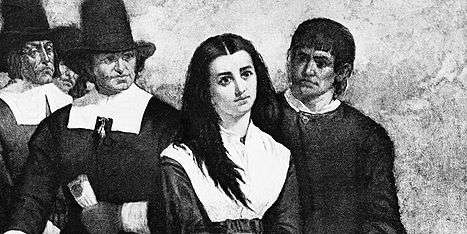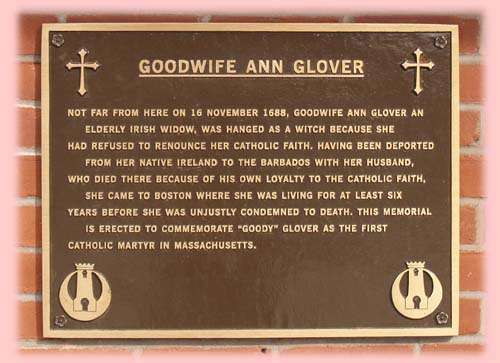Ann Glover
Goodwife "Goody" Ann Glover (died November 16, 1688) was the last person to be hanged in Boston as a witch, although the Salem witch trials in nearby Salem, Massachusetts, occurred mainly in 1692.
Early life

Ann Glover was born in Ireland as a Roman Catholic. Her birth date and much of her background information is unknown. During Cromwell's invasion of Ireland where Oliver Cromwell was rounding up thousands of Irish and Scots, Ann and her husband were transported as indentured servants to Barbados to work on the sugar plantations. Her husband was executed in Barbados for refusing to renounce his Catholic faith.[1] Historians do not know what the context was but at his death, he said that his wife was a witch.[2]
Life in Boston
By 1680, Ann and her daughter were living in Boston—at the time, part of the Massachusetts Bay Colony—where they worked as housekeepers for John Goodwin. In the summer of 1688, Martha Goodwin (age 13) accused Ann Glover's daughter of stealing laundry. This caused Ann to have a fierce argument with Martha and the Goodwin children which then supposedly caused them to become ill and start acting strange.[3] The doctor that was called suggested it was caused by witchcraft because he couldn't diagnose or heal the children. Martha and the other children seemed to be "bewitched" [4]
Glover was arrested and tried for witchcraft. It is unclear whether she could not speak English or would just refuse to speak it. It is more likely that she simply did not know English.[1] Instead she spoke her native language, Irish, and Latin. Reverend Cotton Mather wrote that Glover was "a scandalous old Irishwoman, very poor, a Roman Catholic and obstinate in idolatry."[5] At her trial it was demanded of her to say the Lord's Prayer, she recited it in Irish and broken Latin, but since she had never learned it in English, she could not say it in English.[1] There was a belief that if someone could not recite the Lord's prayer then they were a witch. Her house was searched and "small images" or doll-like figures were found. When Mather was interrogating her she supposedly said that she prayed to a host of spirits and Mather took this to mean that these spirits were demons.[3] Two Puritan men who supposedly spoke Irish said that she confessed to using them for witchcraft. The identity of these men and whether they spoke Irish is unknown. Many of the accusations against Ann used spectral evidence, which can't be proven. Cotton Mather visited Glover in prison where he said that she supposedly engaged in night-time trysts with the devil and other evil spirits. It was considered that Ann might not be of sound mind and could possibly be mentally ill. Five of six physicians checked her and found her to be competent and so she was then pronounced guilty and put to death by hanging.

On November 16, 1688, Glover was hanged in Boston amid mocking shouts from the crowd.[6] When she was taken out to be hanged she said that her death would not relieve the children of their malady. There are several testaments of what her final words were. According to some she said that the children would keep suffering because there were other witches besides her who had been involved with bewitching the children and when asked to name the other witches, she refused. Another account says that Glover said that killing her would be useless because it was someone else that had bewitches the children.[2] Either way, Ann Glover did believe in witches. A Boston merchant who knew her, Robert Calef, said that "Goody Glover was a despised, crazy, poor old woman, an Irish Catholic who was tried for afflicting the Goodwin children. Her behavior at her trial was like that of one distracted. They did her cruel. The proof against her was wholly deficient. The jury brought her guilty. She was hung. She died a Catholic."[7]
The evidence found against her can be argued against. When Glover told Mather that she prayed to a host of spirits she may have been talking about Catholic saints. The dolls she had in her possession that were believed to have been used for witchcraft might actually have been crude representations of Catholic saints. The majority of the population at that time and place was Puritan; some Puritans were prejudiced against Catholics.
One contemporary writer recorded that, "There was a great concourse of people to see if the Papist would relent, her one cat was there, fearsome to see. They would to destroy the cat, but Mr. Calef would not permit it. Before her executioners she was bold and impudent, making to forgive her accusers and those who put her off. She predicted that her death would not relieve the children saying that it was not she that afflicted them."[1]
Legacy
Three hundred years later in 1988, the Boston City Council proclaimed November 16 as Goody Glover Day. She is the only victim of the witchcraft hysteria in the Massachusetts Bay Colony to receive such a tribute. Although Ann Glover's accusations and death were before the commonly known Salem Witch Trials, she was the first Catholic martyr in Massachusetts and would become the basis for many of the cases in the 1692 Salem witch trials.[8]
See also
External links
- Cotton Mather, Memorable Providences, Relating to Witchcrafts and Possessions (1689)
- Ann Glover profile at Irish Heritage Trail website
References
- 1 2 3 4 Historical Records and Studies, Volume 17, pp. 70-78.
- 1 2 ""Goody" Ann Glover, Irish native was the last witch hanged in Boston (VIDEO)". IrishCentral.com. 2015-10-15. Retrieved 2016-05-25.
- 1 2 Boniface. "Unam Sanctam Catholicam". www.unamsanctamcatholicam.com. Retrieved 2016-05-23.
- ↑ The Genealogical Dictionary of New England (ed. James Savage).
- ↑ Magnalia Christi Americana, Cotton Mather, 1702.
- ↑ History of the United States, Volume II, Bancroft, p. 52.
- ↑ More Wonders of the Invisible World, London, 1700.
- ↑ "Goodwife Glover Archives - Wild Eyed Southern Celt". Wild Eyed Southern Celt. Retrieved 2016-05-25.